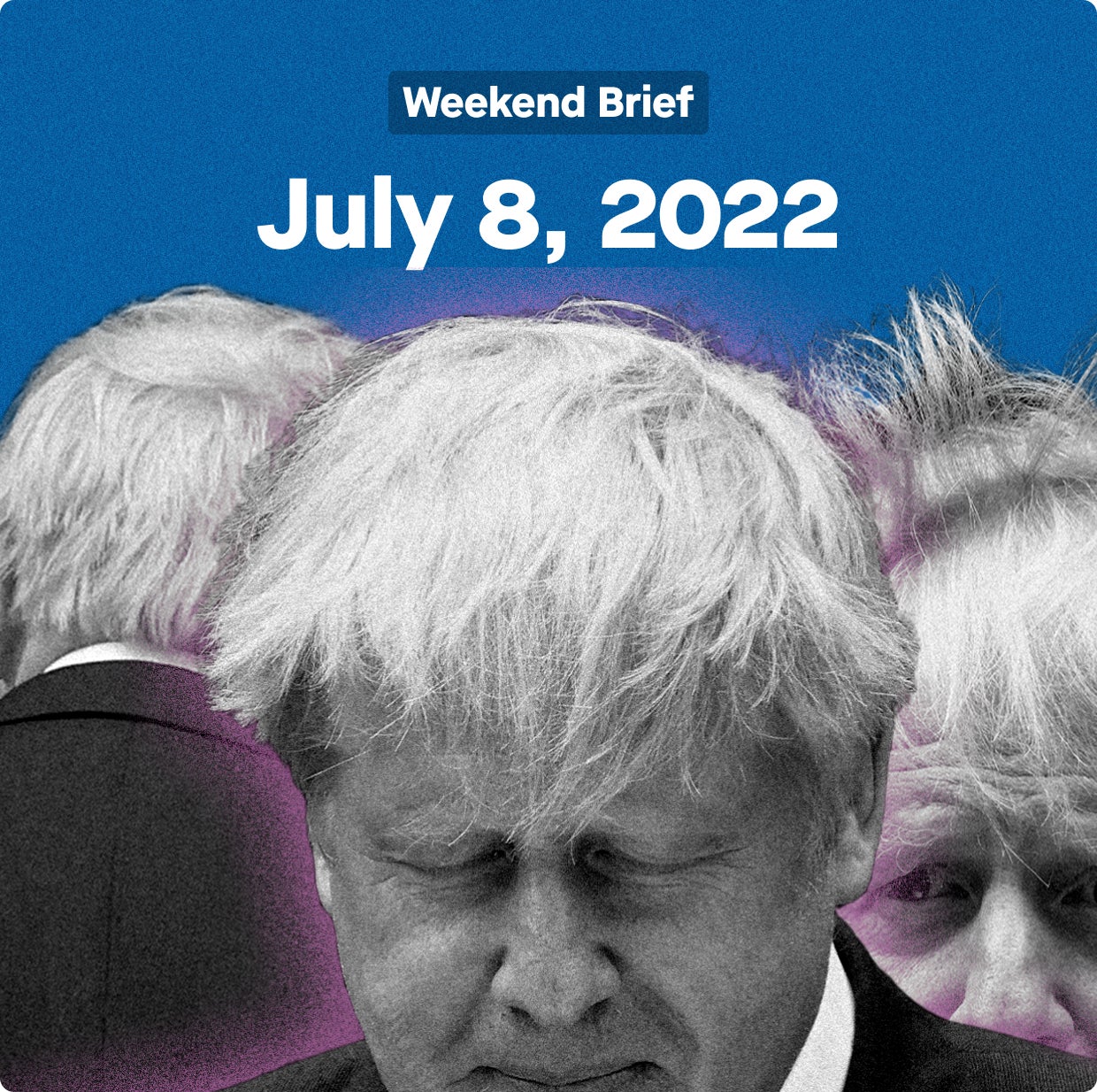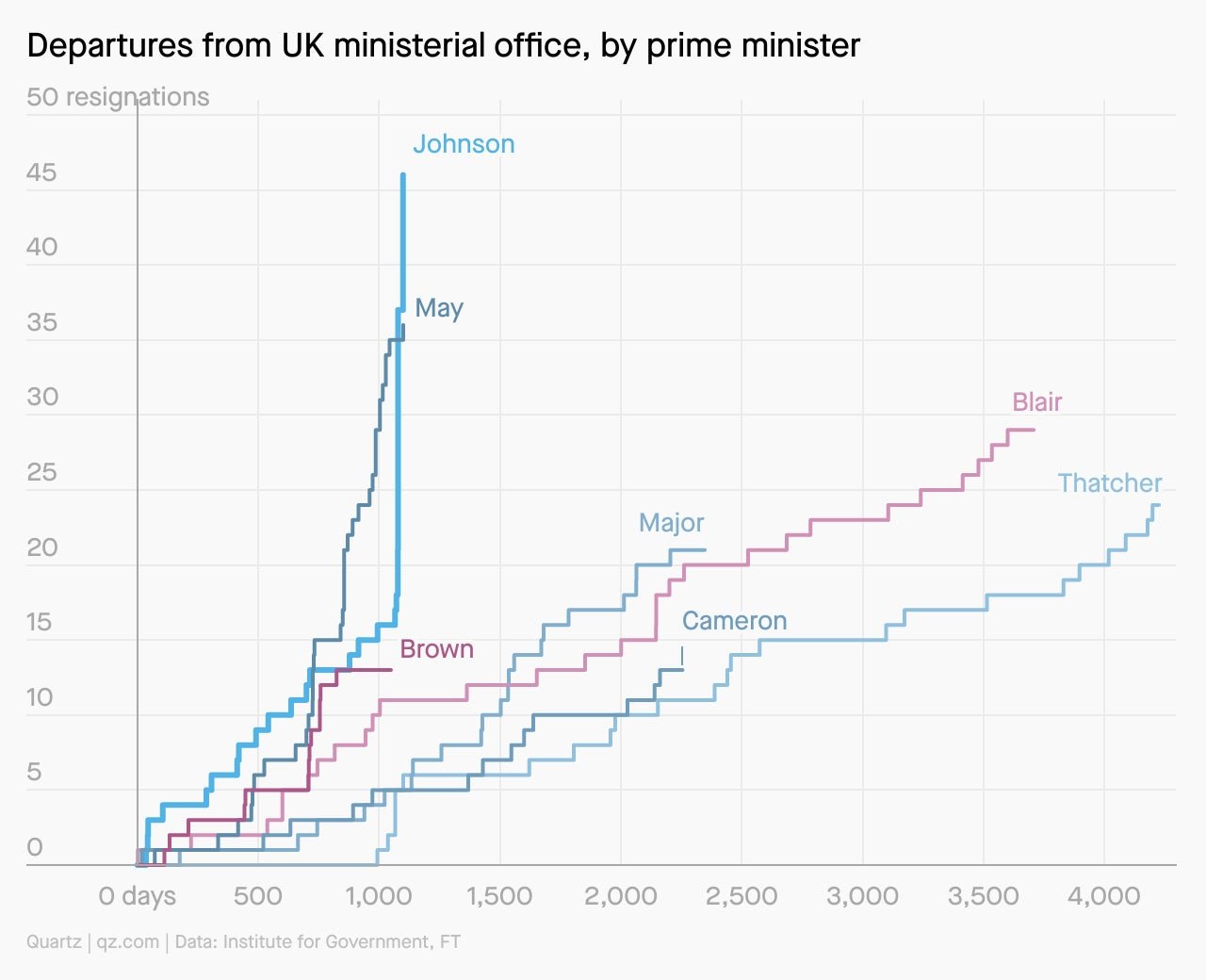✦ Bye bye, Boris
Hi Quartz members,



Hi Quartz members,
This week, after more than 50 lawmakers resigned from Boris Johnson’s government and begged him to step down, the UK prime minister finally did so—though his plan to remain in the post during the leadership transition could make for a divisive, messy summer.
Many on the right will be relieved that a string of scandals, which damaged both Johnson’s reputation and the party, is over. The opposition hopes this opens the door to an election.
What is Johnson’s legacy? The public may remember him, first and foremost, as a liar. But it’s worth noting that Johnson didn’t turn into the UK’s Trump, as some had feared. Indeed, while many celebrate his departure, it’s still possible his successor will be worse.
While Johnson was a mendacious and self-serving prime minister, he didn’t, for example, try to roll back building renewable energy infrastructure, or curb abortion rights. In his political career as a whole he’s often sidestepped those issues, as he sidesteps so much, by abstaining or avoiding votes on them. Steve Baker, one potential successor, has suggested he’d reverse Johnson’s “green” policies. Nadine Dorries, a Johnson devotee, has long been trying to curb women’s right to an abortion, an extreme minority view in the UK.
One thing that most infuriates Johnson’s critics is that he will often say one thing and do another: lauding the National Health Service, for example, while eviscerating it through underfunding. His rhetoric, they point out, can’t be trusted. But rhetoric is still important, and Johnson’s has mostly avoided violence, polarization, and attacks on both objective truth and science-based evidence, which characterize leaders on the harder right, like Donald Trump or Brazil’s Jair Bolsonaro.
A man who broke his own lockdown laws, lied to the people he led, used party money for expensive wallpaper, and won’t answer the question as to how many children he has, can’t be excused, post-hoc, as a pretty good prime minister. But he’s not a monster. The UK should seek for so much better, and guard against worse.
The backstory
- Boris Johnson became the face of the Brexit campaign and has always claimed that he would “get Brexit done.” He didn’t start out pro-Brexit—he reportedly wrote articles supporting both sides before deciding which way to swing—but he did see oversee the UK’s exit from the European Union.
- What Johnson describes as his “incredible” mandate is based on the Conservative party’s landslide win in the general election of December 2019. With Johnson already at the helm after Theresa May’s resignation, and Jeremy Corbyn in opposition, it’s not certain that Johnson’s charisma was the decisive factor—but it probably helped.
- Johnson’s three-year stint as UK leader has been marked by three main events: Brexit, the covid-19 pandemic, and the war in Ukraine. His resignation speech was bullish on his role in all three, and it’s likely his supporters will see successes in these areas as his legacy.
- The other defining factor of his time in office has been scandal: He was fined in April 2022 for breaking his own lockdown rules by attending parties, including at 10 Downing Street, and in June his ethics advisor resigned after Johnson broke the ministerial code. Most recently, Johnson denied he’d ever heard allegations against Steve Pincher, the deputy chief whip, who allegedly groped two people at a party in June. Later, it emerged Johnson was briefed on problems with Pincher back in 2019, and appointed him anyway.
Brexit interlude
Brexit was always a bad idea, economically speaking. By severing its relationship with the EU and its single market, the UK “declared a trade war on itself,” as economist Adam Posen of the Peterson Institute put it. But forecasters who predicted immediate pain following the 2016 Brexit referendum were mostly proven wrong: The pound fell but “businesses and consumers largely shrugged off the result,” writes Jonathan Portes, an economist at King’s College, London, in a new ebook assessing the economic impact of Brexit.
Does that mean the wonks whose forecasts powered the Remain camp were mistaken? Hardly. Instead, Portes concludes that six years post-referendum, “the weight of the evidence presented suggests that—very much as economists predicted—Brexit has made the UK a less open economy, reduced UK trade in both goods and services, and increased prices for some products.” Food prices in the UK, for example, are 6% higher than they’d otherwise be. The fact that these effects are somewhat hidden only adds to the anti-Brexit argument: The whole point of careful economic analysis is to reveal the relationships that anecdote and intuition cannot see.
What to watch for next
- A contest for leadership of the Conservative party will now begin. Potential candidates include Penny Mordaunt, a former defense secretary; Rishi Sunak and Nadhim Zahawi, the former and current chancellors; Sajid Javid, the former health secretary and first to resign in the current slew; Brexit campaigner Michael Gove; defense secretary Ben Wallace; foreign secretary Liz Truss; Jeremy Hunt, a former health secretary; and Suella Braverman, the attorney general. Candidates need support from eight lawmakers to stand.
- Johnson might be forced to leave sooner than he plans. Limping on with a lame duck prime minister probably isn’t the future the Conservative party dreamed of. If Johnson is pushed out now, an interim prime minister like deputy Dominic Raab might govern for a while.
- The Labour Party, the main opposition to Johnson’s Conservatives, will push for a general election—if they think they can win it. The Scottish National Party will continue to demand another referendum on Scottish independence.
- Rumors abound that Johnson wants to stay in post because he’s organized a wedding celebration for himself and Carrie Johnson, whom he married in 2021, at the prime ministerial country house, Chequers. They’ve sent invites; but will it happen?
Chartable
On Wednesday July 6, 16 ministers resigned from Johnson’s government, the most on any single day in British history, and an indication of how quickly his power finally unraveled.
5 great stories from elsewhere
🥁 On rhythm. Circadian rhythms are our bodies’ internal, synchronized clocks. They govern everything from sleep cycles to organ function to individual cells in our bodies, with circadian clocks controlling 50% of our genes. This could have implications for medicine and health, writes the The New York Times as it delves into why personalized circadian medicine, or tuning our own behavior, environment, and treatment to these rhythms, may be the future.
📖 Tweet lore. Tweeted on June 28, 2012, “Everything happens so much” from spambot @Horse_ebooks was an instant viral hit. Now more than a decade old, it continues to resonate with Internet users, having become a slogan, symbol, and source of inspiration for weary web travelers. But this surprising wisdom did not come from an algorithmic void, as detailed in a piece from The Atlantic—turns out, it has human origins. And that may also explain its staying power.
💉 Universal jab. Operation Warp Speed successfully formulated and distributed a covid-19 vaccine to Americans in fewer than 12 months, but the subsequent rollout has been “far less impressive,” says Patrick Collison, CEO of Stripe and co-founder of Fast Grants. In a contribution to Slow Boring, he writes about the steps that could be taken to create a pan-variant vaccine as soon as possible, including speeding up the timeline for human trials and scaling up the rate of manufacturing.
👨🦰 Turkish (H)airlines. Istanbul has become the global go-to city for hair transplants, with clinics offering the cosmetic surgery for a fraction of the usual price. It’s not just a lively Subreddit that draws in millions to Turkey each year for the procedure, but also the country’s Ministry of Health which has cannily jumped on the opportunity to increase medical tourism. In a story from GQ, reporter Alex Hawkins goes under the knife and into the story of how the former Byzantine and Ottoman seat of power became a hub for receding hairline fixes.
👋 Stepping down. UK prime minister Boris Johnson made a high profile resignation this week, but in the finance world there were two others who made their exits with flair. In a short but punchy piece from efinancialcareers, Sarah Butler serves up the juiciest quotes from Stuart Kirk, formerly of HSBC, and Rajeev Misra, formerly of Softbank, who made their leaves with swaggering braggadocio despite some serious career missteps.
Thanks for reading! And don’t hesitate to reach out with comments, questions, or topics you want to know more about.
Have a hopeful weekend,
—Cassie Werber, senior reporter
Additional contributions by Scott Nover, Samanth Subramanian, Walter Frick, and Julia Malleck.
